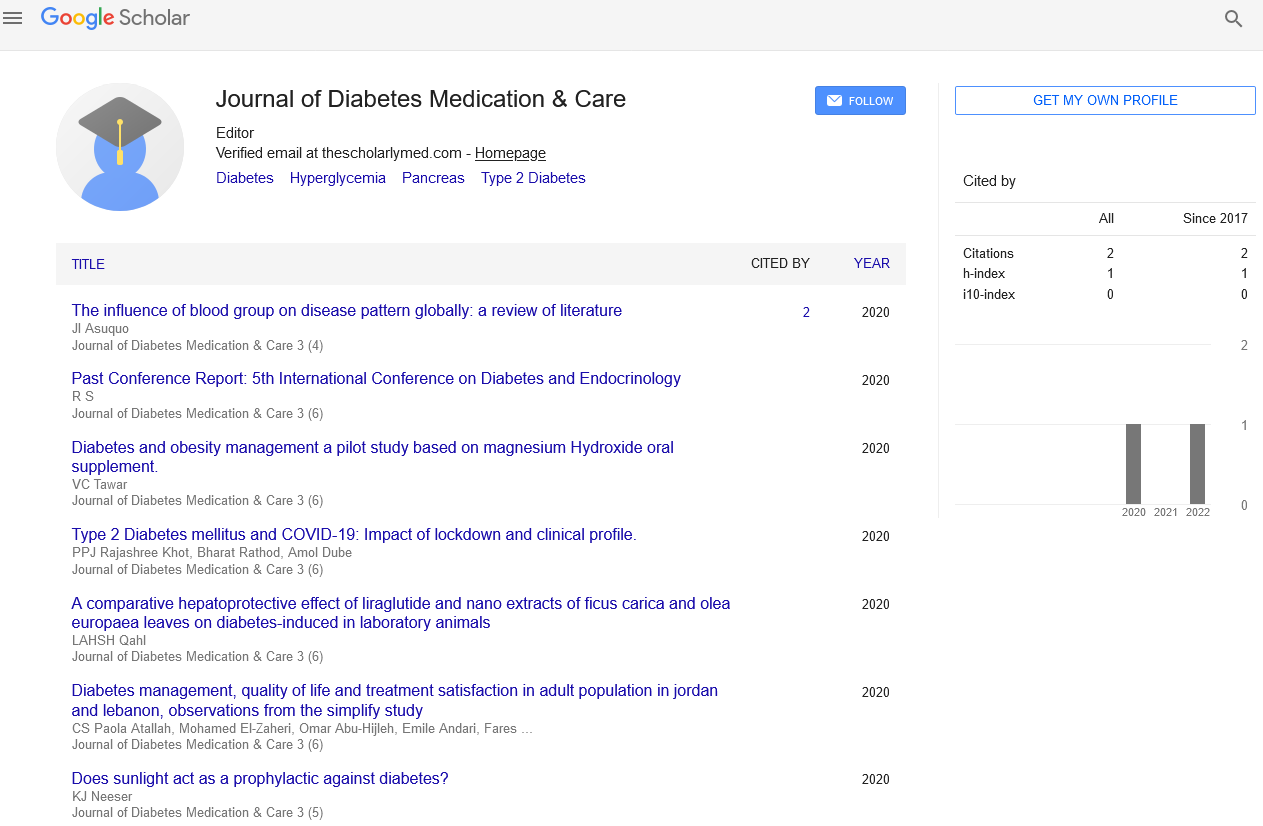Perspective - Journal of Diabetes Medication & Care (2024) Volume 7, Issue 5
Navigating Future Complications of Diabetes: The Role of Routine Medications
- Corresponding Author:
- Kwaang Hung
Department of Endocrinology, University of Tokyo, Tokyo, Japan
E-mail: kwahung@cau.ac.kr
Received: 13-Sep-2024, Manuscript No. JDMC-24-148360; Editor assigned: 16-Sep-2024, PreQC No. JDMC-24-148360 (PQ); Reviewed: 30-Sep-2024, QC No. JDMC-24-148360; Revised: 21-Oct-2024, Manuscript No. JDMC-24-148360 (R); Published: 28-Oct-2024, DOI: 10.37532/JDMC.2024.7(5).275-277
Introduction
Diabetes is a chronic condition characterized by elevated blood sugar levels, which can lead to a myriad of complications if not managed properly. Despite advances in treatment and management, individuals with diabetes remain at risk for both acute and chronic complications. This article explores the potential future complications associated with diabetes and the role of routine medications in mitigating these risks.
Description
Understanding diabetes and its complications
Diabetes primarily exists in two forms: Type 1 and type 2. Type 1 diabetes is an autoimmune condition where the pancreas produces little to no insulin, while type 2 diabetes typically develops in adulthood and is often associated with insulin resistance. Both types can lead to serious health complications affecting various systems in the body.
Common complications of diabetes
Cardiovascular disease: Individuals with diabetes have an increased risk of heart disease and stroke due to damage to blood vessels and nerves that regulate heart function.
Kidney damage (diabetic nephropathy): High blood sugar levels can damage the kidneys’ filtering system, leading to kidney disease, which may progress to kidney failure.
Nerve damage (diabetic neuropathy): High blood sugar can injure the nerves throughout the body, particularly in the legs and feet, causing pain, tingling, or loss of sensation.
Eye damage (diabetic retinopathy): Prolonged high blood sugar levels can damage the blood vessels in the retina, leading to vision impairment or blindness.
Foot damage: Reduced blood flow and nerve damage can lead to foot ulcers and infections, sometimes resulting in amputations.
Skin conditions: Diabetes can make individuals more susceptible to skin infections and other skin disorders.
The role of routine medications
Routine medications are crucial in managing diabetes and preventing complications. The primary goal of these medications is to regulate blood sugar levels, but many also play a protective role against complications. Here’s a look at common medications and how they can help mitigate future complications.
Insulin therapy: For individuals with type 1 diabetes and some with advanced type 2 diabetes, insulin therapy is essential. Insulin helps to lower blood sugar levels effectively. Proper management of blood sugar can significantly reduce the risk of long term complications, including cardiovascular disease and neuropathy. Insulin types include:
Rapid-acting insulin: Works quickly to control blood sugar levels after meals.
Long-acting insulin: Provides a steady release of insulin throughout the day.
Metformin: Metformin is often the first-line medication for type 2 diabetes. It helps reduce glucose production in the liver and improves insulin sensitivity. Studies have shown that Metformin not only helps control blood sugar but also reduces the risk of cardiovascular events, making it a valuable tool in preventing heart disease and kidney damage.
GLP-1 receptor agonists: These medications mimic the action of incretin hormones, which help to regulate insulin secretion in response to meals. GLP-1 receptor agonists also promote weight loss and have been shown to lower the risk of cardiovascular events, thus providing dual benefits for those at risk of heart disease.
SGLT2 inhibitors: SGLT2 inhibitors prevent glucose reabsorption in the kidneys, leading to increased glucose excretion through urine. These medications have been associated with significant reductions in the risk of kidney disease and cardiovascular complications, making them an important addition to diabetes management.
Statins: Given the increased cardiovascular risk associated with diabetes, statins are often prescribed to manage cholesterol levels. Regular use of statins can significantly reduce the risk of heart attack and stroke in individuals with diabetes.
Antihypertensives: High blood pressure is common in individuals with diabetes and contributes to the risk of cardiovascular complications. Routine use of antihypertensive medications can help control blood pressure and protect against heart disease and kidney damage.
The importance of regular monitoring
In addition to medications, regular monitoring of blood sugar levels, blood pressure, and cholesterol is essential. Continuous Glucose Monitoring (CGM) systems allow patients to track their blood sugar in real-time, providing valuable data to adjust medications and lifestyle choices. Regular check-ups with healthcare providers can ensure timely interventions to prevent complications.
Lifestyle modifications
While routine medications are critical, lifestyle modifications also play a vital role in managing diabetes and preventing future complications:
Dietary changes: A balanced diet rich in whole grains, lean proteins, healthy fats, and plenty of fruits and vegetables can help manage blood sugar levels.
Physical activity: Regular exercise improves insulin sensitivity and helps maintain a healthy weight, both of which are crucial for managing diabetes.
Weight management: Maintaining a healthy weight can reduce the risk of developing type 2 diabetes and its associated complications.
Stress management: Chronic stress can negatively impact blood sugar levels, so incorporating stress-reduction techniques such as meditation or yoga can be beneficial.
Psychological aspects of diabetes management
Living with diabetes can take an emotional toll, leading to anxiety or depression, which can hinder effective management. It is essential to address the psychological aspects of diabetes care:
Counselling: Engaging in therapy or support groups can help individuals cope with the emotional challenges of managing a chronic condition.
Education: Understanding the disease process and treatment options empowers patients, fostering a proactive approach to their health.
Future considerations
As medical research advances, new therapies and technologies are continually emerging to improve diabetes management and reduce the risk of complications. Some promising areas include:
Artificial pancreas systems: These devices automatically monitor blood glucose levels and deliver insulin as needed, helping to maintain optimal blood sugar levels without constant manual intervention.
Gene therapy: Research into gene therapy aims to provide long lasting solutions for diabetes management, potentially eliminating the need for daily insulin injections.
Personalized medicine: Advances in genomics and biotechnology may allow for more tailored treatment plans, optimizing medication use based on an individual’s genetic makeup.
Conclusion
The future of diabetes management hinges on a combination of effective medications, lifestyle changes, and ongoing education. While complications are a reality for many individuals with diabetes, routine medications play a crucial role in preventing and managing these risks. By understanding the potential complications and the importance of medication adherence, individuals can take proactive steps to protect their health.
Empowerment through knowledge, regular monitoring, and support systems can lead to a better quality of life for those living with diabetes. With continuous advancements in treatment options and technology, the outlook for individuals with diabetes is increasingly optimistic, paving the way for a healthier future.

